Questões de Língua Inglesa da Fundação Universa (FUNIVERSA)
Lista completa de Questões de Língua Inglesa da Fundação Universa (FUNIVERSA) para resolução totalmente grátis. Selecione os assuntos no filtro de questões e comece a resolver exercícios.
.
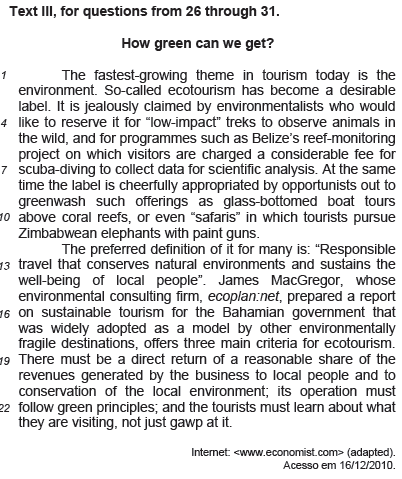
Concerning the vocabulary in the text III, it can be assumed that
- A.
cheerfully (line 8) is synonymous with selfishly.
- B.
pursue (line 10) means the same as observation.
- C.
widely (line 17) is an exact synonym of tentatively.
- D.
revenues (line 20) means precisely the same thing as taxation.
- E.
follow (line 22) can be replaced in this particular context by stick to.
.
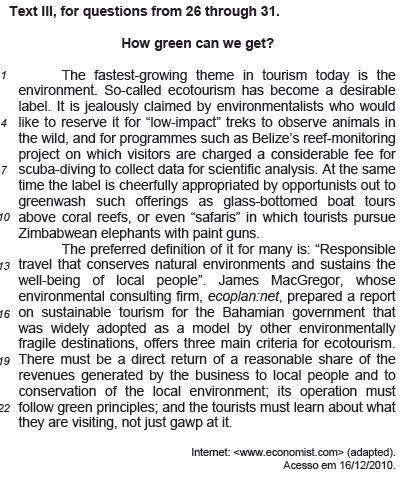
In the text III, the word greenwash (line 9) can be understood as
- A.
to use in an exploitative fashion lakes, rivers and coastal areas that are surrounded by luxuriant vegetation.
- B.
to offer a tourist something that looks suspiciously cheap.
- C.
the use of washing products or detergents that do not affect or damage rivers or forests.
- D.
to hide or obscure ecologically damaging activities deliberately in order to profit from a given situation.
- E.
to use a green pigment to gun paint elephants without harming them.
.
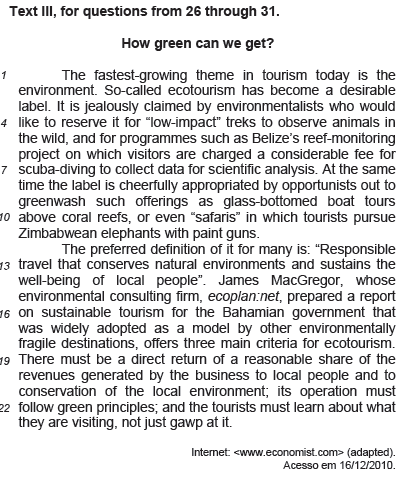
It can be concluded from the text III that
- A.
whose (line 14) can be replaced by which or that.
- B.
safaris (line 10) is in inverted commas to signal that there are no real safaris in Zimbabwe anymore for the local tourist authorities have banned them because they regard them as politically incorrect.
- C.
if has become (line 2) is replaced by became, no change whatsoever in meaning will take place in the sentence.
- D.
for scuba-diving (lines 6 and 7) can be replaced by in order to scuba dive.
- E.
must (line 19) expresses the notions of desirability or advisability.
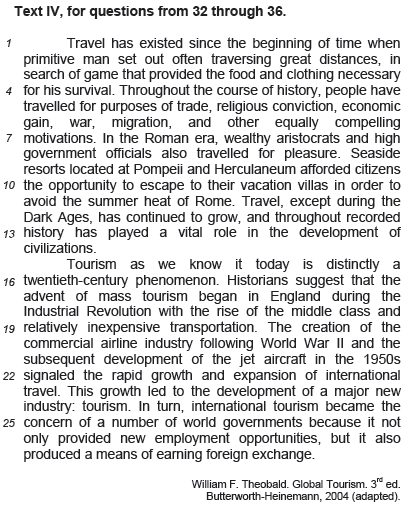
The expression In turn (line 24) can be paraphrased as
- A.
Nevertheless.
- B.
As a matter of fact.
- C.
As a result.
- D.
In no time.
- E.
Sooner or later.
.
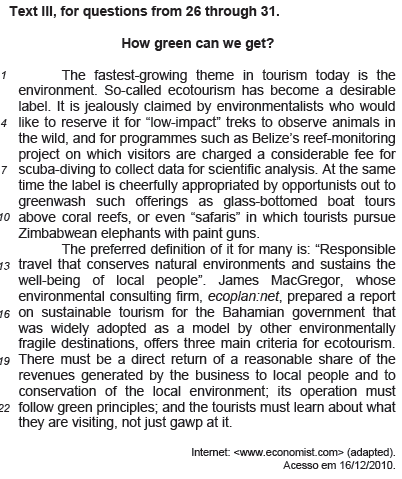
In relation to the text III, it can be assumed that
- A.
average tourists favourite activity is going reef-monitoring in Belize in the summer.
- B.
scientists who go underwater swimming pay a sizeable sum to study the local flora and fauna of the Belizean reefs.
- C.
Belizean tourist authorities are willing to engage in illegal activities, if considerable fees are offered to them.
- D.
glass-bottomed boat trips are by far the favoured mode of scientific data collecting in Belize.
- E.
Belizean tourist authorities regard gun-painting animals as exploitative and are planning to charge a lot of extra money to allow it.
.
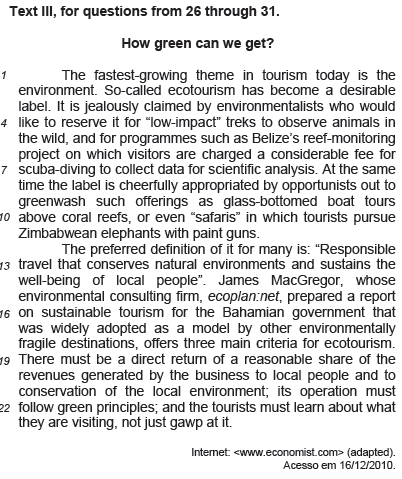
It can be concluded from the text III that
- A.
government tourist authorities and environmentalists are extremely jealous of each others sphere of influence within particular countries, as far as ecotourism is concerned.
- B.
gun-painting safari animals in Zimbabwe is a striking example of sensible ecotourism.
- C.
foreign scientists usually choose Belizean beaches as their prime destination for conducting marine biology research.
- D.
individuals who travel to a given place with the sole aim of quietly walking about and unintrusively watching its local wild fauna can be labelled low impact trekkers.
- E.
its authors explicit goal is to criticize publicly both Central American and African tourism authorities for their ultimate failure to stop ecologically incorrect behaviour.
.
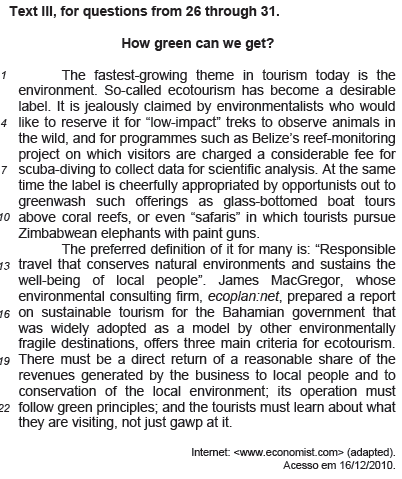
In terms of meaning, gawp (line 23) can be understood as
- A.
staring at something stupidly.
- B.
taking something for granted.
- C.
spraying something with paint.
- D.
enjoying something immensely.
- E.
considering something as sacred.
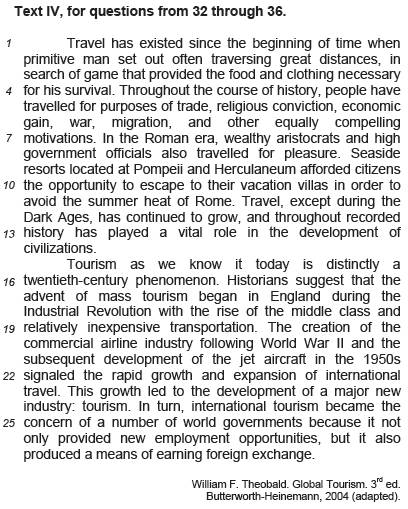
It can be inferred from the text IV that
- A.
ancient Romans escaped the heat of the eruptions of Pompeii and Herculaneum volcanoes taking trips to their villas in the suburbs of Rome.
- B.
efficient and affordable means of transport have provided one of the basic requisites for the rise of modern tourism.
- C.
middle class English people have always been passionate about international travel.
- D.
the industry of tourism suffered a drastic decline during the Dark Ages.
- E.
the Industrial Revolution increased the living standards of the working classes allowing them, for the first time in history, to take trips for pleasure abroad.
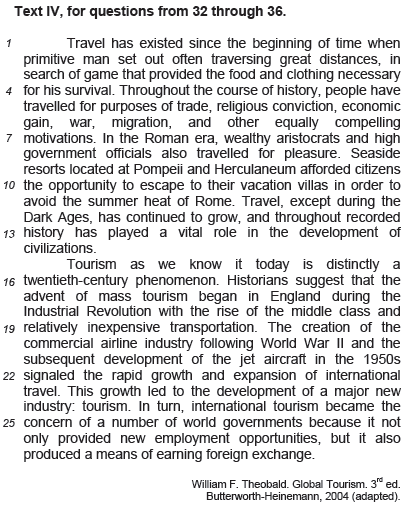
The expression primitive man (line 2), in this particular context, means
- A.
a neolithic man.
- B.
archaic men or women.
- C.
pre-historic human beings.
- D.
an aboriginal male or female individual.
- E.
a primordial manly person.
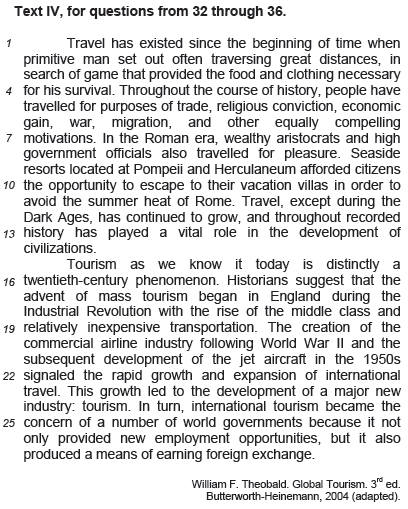
The expression the Dark Ages (lines 11 and 12)
- A.
can be also spelled as the dark ages, without resulting in any change in meaning in this context.
- B.
alludes to a period in the tourist industry when business was rather slow and there was a general feeling of pessimism.
- C.
means any period, real or imaginary, of great personal sadness and frustration.
- D.
refers to human beings old age, when they are approaching their death.
- E.
describes a particular chronological age in history.


